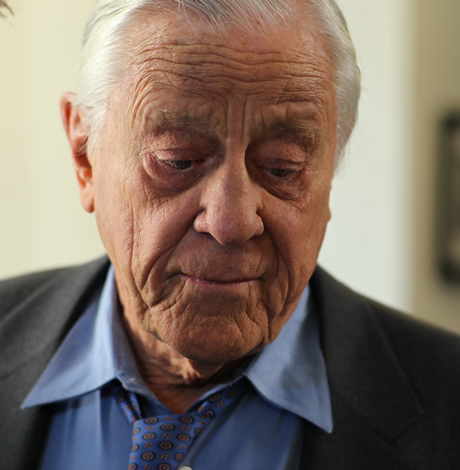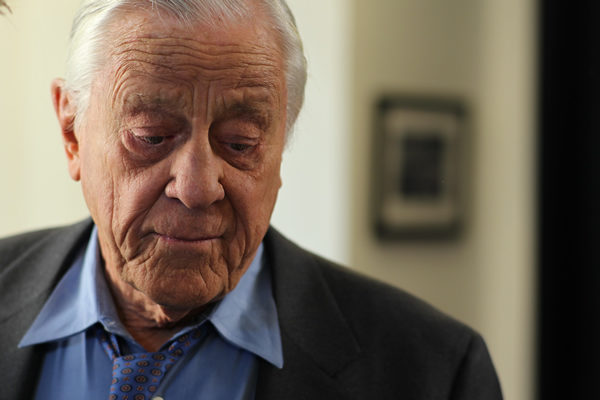Arts & Entertainment
Before Stonewall, newspapers complicit with police in gay bar raids


Fifty years ago, members of the LGBT community tired of continuous police raids on gay bars were driven to riot in the streets of New York City after the latest incursion at the Stonewall Inn on the evening of June 26, 1969.
But police raids on gay bars in the days before the Stonewall riots went hand-in-hand with the subsequent reports in newspapers the next day outing individuals caught in the raids, which would have potentially blacklisted them for the remainder of their lives.
In terms of Washington news coverage, the authority on newspapers outing gay men caught in police raids is Edward Alwood, a former CNN correspondent and now adjunct lecturer at the Philip Merrill College of Journalism at University of Maryland, College Park.
Alwood wrote about the practice in his 1996 book “Straight News: Gays, Lesbians, and the News Media,” and spoke about it in an interview with the Washington Blade.
“Washington was very different from New York,” Alwood said, “in that so much of the gay community here was connected with the federal government, and for that reason…gay men were much more closeted here and much less likely to protest as they did in New York.”
That perspective within D.C.’s gay community started to change, Alwood said, when gay rights pioneer Frank Kameny was outed, lost his job in the federal government as an astronomer and formed the Mattachine Society. Nonetheless, Alwood said during that time there would be newspaper articles reporting on gay raids that named individuals who were caught.
Reading from his book, Alwood said the D.C. press after World War II made vague references to homosexuals in describing street crimes, “particularly police campaigns to clean up public parks, including Lafayette Park across from the White House.” (Lafayette Park had been a place where gay men would meet to have sex discreetly.)
The Washington Post in the 1940s, Alwood said, described how officers shuttled groups of men from the park to the city jail throughout one night in July 1947 as 41 were arrested in the park.
The Washington Star reported that the metropolitan police staged a raid just to see who the men were. Similarly, the Post celebrated a crackdown a year later, when a headline read, “One-Man Vice Squad Arrests Eight More.”
“The article lavished praise on a handsome undercover officer who was deemed the the city’s most successful weapon in combating vice,” Alwood said. “Neither newspaper explained why the police felt compelled to target law-abiding citizens because they were considered unwelcome in public parks.”
Alwood quoted Benjamin Bradlee, the Post editor during its Pentagon Papers and Watergate coverage in the 1970s, as dismissive of the coverage in reflections of the time when he started at the newspaper covering vice on the crime beat.
“The police sent these guys into men’s rooms where they sort of lollygag around to see if anybody would make a pass at them,” Alwood quoted Bradlee as saying. “They would make sure the press heard about it. The Post never made a big deal out of it. We had little one paragraph that had that no news value, of course, but that’s what it was.”
For lesbians, Alwood said, the situation was different. For starters, sodomy was an offense perceived as something only men could commit, he said, so homosexual acts weren’t considered against the law. There were no lesbian bars, he said, so women met instead at women’s homes.
“They had these social clubs, so that’s part of the difference that happened, which is why so many more men wound up having their names and their ages and their street addresses listed in the newspapers,” Alwood said.
Nonetheless, Alwood said there was coverage of lesbians. One piece in the Washington Times-Herald, drew on the Red Scare of a Russian threat during the Cold War for a sensational article.
Under the headline, “Reds entice women here in sex orgies,” the article described an alleged plot by Russian agents to entice women employees of the State Department into homosexuality,” Alwood said.
“Russian agents were waging a systematic campaign to bring women employees of the State Department under their control by enticing them into a life of lesbianism,” Alwood said. “As many as 65 or 70 persons attended a single one of these lavish get-togethers, according to a congressional committee. Many were garbed in rich Oriental costumes to help them get into the spirit of things.”
Such coverage isn’t found today in Washington-area newspapers, which have been accepting of the D.C. LGBT community and seek to capitalize on LGBT events, such as Capital Pride. The Post, however, didn’t respond to the Washington Blade’s request for comment on past coverage outing gay men and whether any formal decision was made to change it.
Alwood said he’s unaware of any one instance that indicated “any flipping of the switch, so to speak,” but said the arrest of Walter Jenkins, a close aide to former President Lyndon Johnson, in 1964 on “moral charges” at the YMCA was a turning point.
“I think it was a wake-up call for journalists in this city because now it wasn’t just anonymous low-ranking people in men’s rooms and parks getting arrested, it was a high-level front page story of a presidential aide,” Alwood said. “And I think as a result of that, I’m just guessing, more journalists, such as those at the Post, realized they knew gay people and they didn’t fit the stereotype.”
Also at that time, Alwood said, more and more D.C. gay groups were protesting police actions, which led to a re-examination of the strict laws.
One period that marked a change, Alwood said, was when Albert Finney became managing editor of the Post. During his tenure, Alwood said Finney assigned a reporter to write an in-depth series about gay people in D.C.
“The series was stunning for its time,” Alwood said. “It was in-depth, bold, insightful. Though its premise rested on old stereotypes and clinical language, like homosexual, it pushed the boundaries of ignorance and denial to a new level of openness.”
Photos
PHOTOS: Montgomery County Pride in the Plaza
LGBTQ celebration held in downtown Silver Spring

Montgomery County Pride in the Plaza was held on Sunday, June 29 at Veterans Plaza in Silver Spring, Md.
(Washington Blade photos by Michael Key)























The fifth annual Fredericksburg Pride march and festival was held on Saturday, June 28. A march through the streets of downtown Fredericksburg, Va. was followed by a festival at Riverfront Park.
(Washington Blade photos by Michael Key)



















India
Anaya Bangar challenges ban on trans women in female cricket teams
Former Indian cricketer Sanjay Bangar’s daughter has received support

Anaya Bangar, the daughter of former Indian cricketer Sanjay Bangar, has partnered with the Manchester Metropolitan University Institute of Sport in the U.K. to assess her physiological profile following her gender-affirming surgery and undergoing hormone replacement therapy.
From January to March 2025, the 23-year-old underwent an eight-week research project that measured her glucose levels, oxygen uptake, muscle mass, strength, and endurance after extensive training.
The results, shared via Instagram, revealed her metrics align with those of cisgender female athletes, positioning her as eligible for women’s cricket under current scientific standards. Bangar’s findings challenge the International Cricket Council’s 2023 ban on transgender athletes in women’s cricket, prompting her to call for a science-based dialogue with the Board of Control for Cricket in India and the ICC to reform policies for transgender inclusion.
“I am talking with scientific evidence in my hand,” Bangar said in an interview posted to her Instagram page. “So, I hope, this makes an impact and I will be hoping to BCCI and ICC talking with me and discussing this further.”
On Nov. 21, 2023, the ICC enacted a controversial policy barring trans women from international women’s cricket. Finalized after a board meeting in Ahmedabad, India, the regulation prohibits any trans player who has experienced male puberty from competing, irrespective of gender-affirming surgery or hormone therapy. Developed through a 9-month consultation led by the ICC’s Medical Advisory Committee, the rule aims to safeguard the “integrity, safety, and fairness” of women’s cricket but has drawn criticism for excluding athletes like Canada’s Danielle McGahey, the first trans woman to play internationally. The policy, which allows domestic boards to set their own rules, is slated for review by November 2025.
Bangar shared a document on social media verifying her participation in a physiological study at the Manchester Metropolitan University Institute of Sport, conducted from Jan. 20 to March 3, 2025, focused on cricket performance. The report confirmed that her vital metrics — including haemoglobin, blood glucose, peak power, and mean power — aligned with those of cisgender female athletes. Initially, her fasting blood glucose measured 6.1 mmol/L, slightly above the typical non-diabetic range of 4.0–5.9 mmol/L, but subsequent tests showed it normalized, reinforcing the study’s findings that her physical profile meets female athletic standards.
“I am submitting this to the BCCI and ICC, with full transparency and hope,” said Bangar. “My only intention is to start a conversation based on facts not fear. To build space, not divide it.”
In a letter to the BCCI and the ICC, Bangar emphasized her test results from the Manchester Metropolitan University study. She explained that the research aimed to assess how hormone therapy had influenced her strength, stamina, haemoglobin, glucose levels, and overall performance, benchmarked directly against cisgender female athletic standards.
Bangar’s letter to the BCCI and the ICC clarified the Manchester study was not intended as a political statement but as a catalyst for a science-driven dialogue on fairness and inclusion in cricket. She emphasized the importance of prioritizing empirical data over assumptions to shape equitable policies for trans athletes in the sport.
Bangar urged the BCCI, the world’s most influential cricket authority, to initiate a formal dialogue on trans women’s inclusion in women’s cricket, rooted in medical science, performance metrics, and ethical fairness. She called for the exploration of eligibility pathways based on sport-specific criteria, such as haemoglobin thresholds, testosterone suppression timelines, and standardized performance testing. Additionally, she advocated for collaboration with experts, athletes, and legal advisors to develop policies that balance inclusivity with competitive integrity.
“I am releasing my report and story publicly not for sympathy, but for truth. Because inclusion does not mean ignoring fairness, it means measuring it, transparently and responsibly,” said Bangar in a letter to the BCCI. “I would deeply appreciate the opportunity to meet with you or a representative of the BCCI or ICC to present my findings, discuss possible policy pathways, and work towards a future where every athlete is evaluated based on real data, not outdated perceptions.”
Before her transition, Bangar competed for Islam Gymkhana in Mumbai and Hinckley Cricket Club in the U.K., showcasing her talent in domestic cricket circuits. Her father, Sanjay Bangar, was a dependable all-rounder for the Indian national cricket team from 2001 to 2004, playing 12 test matches and 15 One Day Internationals. He later served as a batting coach for the Indian team from 2014 to 2019, contributing to its strategic development.
Cricket in India is a cultural phenomenon, commanding a fanbase of more than 1 billion, with more than 80 percent of global cricket viewership originating from the country.
The International Cricket Council, the sport’s governing body, oversees 12 full member nations and more than 90 associate members, with the U.S. recently gaining associate member status in 2019 and co-hosting the 2024 ICC Men’s T20 World Cup. The BCCI generated approximately $2.25 billion in revenue in the 2023–24 financial year, primarily from the Indian Premier League, bilateral series, and ICC revenue sharing. The ICC earns over $3 billion from media rights in India alone for the 2024–27 cycle, contributing nearly 90 percent of its global media rights revenue, with the BCCI receiving 38.5 percent of the ICC’s annual earnings, approximately $231 million per year.
Women’s cricket in India enjoys a growing fanbase, with over 300 million viewers for the Women’s Premier League in 2024, making it a significant driver of the sport’s global popularity. The International Cricket Council oversees women’s cricket in 12 full member nations and over 90 associate members, with the U.S. fielding a women’s team since gaining associate status in 2019 and competing in ICC events like the 2024 Women’s T20 World Cup qualifiers. The BCCI invests heavily in women’s cricket, allocating approximately $60 million annually to the WPL and domestic programs in 2024–25, while contributing to the ICC’s $20 million budget for women’s cricket development globally. India’s media market for women’s cricket, including WPL broadcasting rights, generated $120 million in 2024, accounting for over 50 percent of the ICC’s women’s cricket media revenue.
“As a woman, I feel when someone says that they are women, then they are, be trans or cis. A trans woman is definitely the same as a cis woman emotionally and in vitals, and specially, when someone is on hormone replacement therapy. Stopping Anaya Bangar from playing is discrimination and violation of her rights. It is really sad and painful that every transwoman need to fight and prove their identity everywhere,” said Indrani Chakraborty, an LGBTQ rights activist and a mother of a trans woman. “If ICC and BCCI is stopping her from playing for being transgender, then I will say this to be their lack of awareness and of course the social mindsets which deny acceptance.”
Chakraborty told the Blade that Bangar is an asset, no matter what. She said that the women’s cricket team will only benefit by participation, but the discriminating policies are the hindrance.
“Actually the transgender community face such discrimination in every sphere. In spite of being potent, they face rejection. This is highly inhuman. These attitudes is regressive and will never let to prosper. Are we really in 2025?,” said Chakraborty. “We, our mindset and the society are the issues. We, as a whole, need to get aware and have to come together for getting justice for Anaya. If today, we remain silent, the entire community will be oppressed. Proper knowledge of gender issues need to be understood.”
The BCCI and the International Cricket Council have not responded to the Blade’s repeated requests for comment.
-

 U.S. Supreme Court5 days ago
U.S. Supreme Court5 days agoSupreme Court upholds ACA rule that makes PrEP, other preventative care free
-

 U.S. Supreme Court5 days ago
U.S. Supreme Court5 days agoSupreme Court rules parents must have option to opt children out of LGBTQ-specific lessons
-

 Television5 days ago
Television5 days ago‘White Lotus,’ ‘Severance,’ ‘Andor’ lead Dorian TV Awards noms
-

 Music & Concerts5 days ago
Music & Concerts5 days agoBerkshire Choral to commemorate Matthew Shepard’s life












